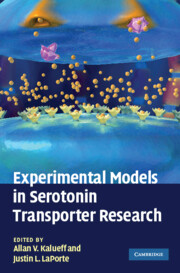Book contents
- Frontmatter
- Contents
- List of contributors
- Preface: Focus on the serotonin transporter
- 1 Presynaptic adaptive responses to constitutive versus adult pharmacologic inhibition of serotonin uptake
- 2 Cellular and molecular alterations in animal models of serotonin transporter disruption: a comparison between developmental and adult stages
- 3 Developmental roles for the serotonin transporter
- 4 SERT models of emotional dysregulation
- 5 The serotonin transporter and animal models of depression
- 6 The serotonin transporter knock-out rat: a review
- 7 Wistar–Zagreb 5HT rats: a rodent model with constitutional upregulation/downregulation of serotonin transporter
- 8 The role of the serotonin transporter in reward mechanisms
- 9 Modeling SERT × BDNF interactions in brain disorders: single BDNF gene allele exacerbates brain monoamine deficiencies and increases stress abnormalities in serotonin transporter knock-out mice
- 10 Primate models in serotonin transporter research
- 11 The role of serotonin transporter in modeling psychiatric disorders: focus on depression, emotion regulation, and the social brain
- Index
- Plate section
- References
5 - The serotonin transporter and animal models of depression
Published online by Cambridge University Press: 06 July 2010
- Frontmatter
- Contents
- List of contributors
- Preface: Focus on the serotonin transporter
- 1 Presynaptic adaptive responses to constitutive versus adult pharmacologic inhibition of serotonin uptake
- 2 Cellular and molecular alterations in animal models of serotonin transporter disruption: a comparison between developmental and adult stages
- 3 Developmental roles for the serotonin transporter
- 4 SERT models of emotional dysregulation
- 5 The serotonin transporter and animal models of depression
- 6 The serotonin transporter knock-out rat: a review
- 7 Wistar–Zagreb 5HT rats: a rodent model with constitutional upregulation/downregulation of serotonin transporter
- 8 The role of the serotonin transporter in reward mechanisms
- 9 Modeling SERT × BDNF interactions in brain disorders: single BDNF gene allele exacerbates brain monoamine deficiencies and increases stress abnormalities in serotonin transporter knock-out mice
- 10 Primate models in serotonin transporter research
- 11 The role of serotonin transporter in modeling psychiatric disorders: focus on depression, emotion regulation, and the social brain
- Index
- Plate section
- References
Summary
ABSTRACT
The serotonin transporter (SERT), a membrane protein responsible for the reuptake of extracellular serotonin, is a prominent target of antidepressants. Moreover, a polymorphism of this gene that decreases serotonin uptake has been linked to depression. However, the role of SERT in depression is poorly understood. Several functional impairments, notably in behavior, sleep, and response to stress, are consistently found in animal models of depression, but consistent correlation with serotonergic dysfunction has not been demonstrated. Nevertheless, in certain genetic backgrounds, the same impairments are also found in mutant rodents in which serotonin transport has been abolished. These impairments are also observed in adult rodents after a transient disruption of serotonin transport during the first postnatal month. Conversely, they may be prevented in mutant rodents by normalizing serotonergic transmission postnatally. Therefore, the function of the serotonin transporter during postnatal development is critical for the proper maturation of brain circuits, while susceptibility to depression caused by reduced serotonin transporter function may be determined, in part, during development.
INTRODUCTION
Depression is one of the most common psychiatric disorders in developed countries. This disease affects mood, psychomotor activity, neurovegetative functions, and cognition (Fava and Kendler,2000). Estimates indicate a lifetime prevalence up to 20% for major depression (Blazer, 2000; Fava and Kendler, 2000; Kornstein et al., 2000), and the likelihood of experiencing this disorder is twice as high in women as in men (Kornstein et al., 2000). Depression can be a lifelong episodic disorder with multiple recurrences.
Information
- Type
- Chapter
- Information
- Experimental Models in Serotonin Transporter Research , pp. 135 - 169Publisher: Cambridge University PressPrint publication year: 2010
